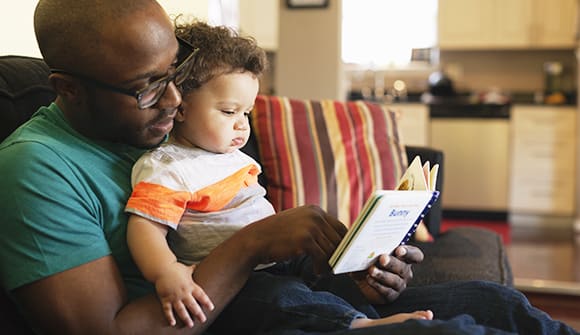The benefits of books
How reading to baby helps boost vocabulary.
Article Author: Katie McPherson
Article Date:

The Cat in the Hat. The Hungry Caterpillar. If You Give A Mouse A Cookie. Everyone has a favorite book from their childhood, and parents dream of sitting in their rocking chairs and sharing that beloved story with their own little one. But in reality, busy schedules and toddler antics can make it a little more difficult to get through story time.
Speech-language pathologist Lori Allen, MS, team lead for the Wolfson Children’s Rehabilitation Speech and Language Pathology program, said there are countless ways reading benefits your baby’s or toddler’s development. And, she shares tips for helping engage your child while reading.
Books = brain food
Allen recommends reading to your child as much as possible, but says not to feel defeated if it doesn’t work out every day. Any time spent reading offers a number of benefits: quality time together, learning language, and building a lifelong love of books.
“Reading to your child develops their language skills, their understanding of how our voices are used to talk about things, and their vocabulary,” she said. “Research shows you say words while reading that you wouldn’t normally say in day-to-day life, so the best way to build your child’s vocabulary is through reading. The best screening for school readiness and success is vocabulary.”
Is your toddler less bookworm, more wild animal?
While some kids may love storytime, others may not sit still for more than 30 seconds…on a good day. Allen said it’s OK if you don’t feel like your child absorbs every word you read; they’re listening. Changing how you sit together so your child can see your expressions can help keep them reeled in, too. Or, you can take advantage of when they’re trapped.
“One great position that makes it harder for them to move around is sitting them on their bottom in the corner of the couch, then you sit on the floor in front of them and read face-to-face,” said Allen. “Hearing and watching you read energetically can engage them a little better. You can also read to them while you’re riding in the car and they’re strapped in the car seat.”
And if your little one just isn’t having it, ditch the text altogether.
“If they can’t make it through four lines of text on a page, turn it and see where their eyes go in the picture, and say that word. Making up a story or talking about the pictures is the same as reading. Read cereal boxes and signs when you drive to the store. It doesn’t always have to be in a book.”
Making the most of every story
Want to make sure your kiddo reaps all the developmental benefits of being read to? Then Allen recommends doing what researchers call “explicit reading.” That means not just reading the text in the book that tells the story, but talking about the words, too.
“If there’s a stop sign in the book, stop and say, ‘Look, a word! What does that say?’ ‘Can we find the letters of your name?’ ‘Is this a capital or lowercase letter?’ ‘Is this a long word or a short word?’” Allen explained.
Next, create what Allen calls a “literacy-rich environment” by keeping books around the house where your kid can access them anytime to look at pictures, practice turning pages, and more.
It’s also helpful to choose the right kind of books. For infants, Allen recommends board books with simple pictures and vocabulary. She said the thick pages make it easier for babies to learn to turn them one at a time, left to right. Between the ages of 1 and 2, move into stories with full sentences, and from ages 3 to 5, incorporate stories with all the words.
“Choose books with different kinds of text such as thought bubbles in all capital letters like they’re shouting or excited,” Allen said. “Little Blue Truck is a great example because when it goes ‘vroom,’ the vroom is huge across the page. The goal is to relate the text to the picture and give it meaning, which develops language.”
If you have concerns about your child’s literacy or speech, a pediatric speech-language therapist can provide an expert assessment and create a personalized plan of action for your family. To schedule an appointment, call Wolfson Children’s Rehabilitation at 904.202.4200.



